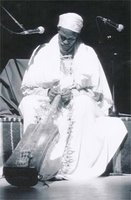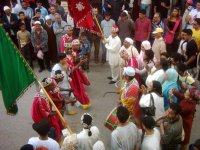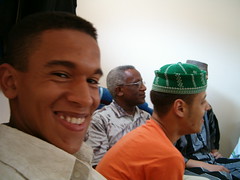Thursday, June 29, 2006
Saturday, June 24, 2006
15 Minutes...?
 More like a quarter of a second. In any case, my ugly mug played nationwide on Moroccan TV for a brief instant, just after midnight and right before the weather.
More like a quarter of a second. In any case, my ugly mug played nationwide on Moroccan TV for a brief instant, just after midnight and right before the weather.The occasion was a truly historical meeting and joint press conference between H'mida Boussou and Abdellah El Gourd, to which I was a witness. These two have had some differences and misunderstandings in the past, but that's all over now. I got some nice pictures, too.
The festival is really different, much more professional (albeit not enough for the professional musicians) than it was 4 years ago. Essaouira is looking much cleaner, with more paved spaces, grass, and shrubbery. The main stage has also been moved to Bab Marrakech, and the open dirt parking lot that used to be between the medina and the Hotel des Iles has been paved and planted over, and a KITEA store is now there (the Moroccan IKEA).
I can only assume that the classy Hotel des Iles didn't appreciate the main stage being so close, since it is a very quiet and respectable place, despite its main claim to fame being the fact/myth that Orson Welles downed a bottle of Scotch in the bar--now named for the director--every night during the shooting of Othello, which won the Palme d'Or at Cannes in 1952.
Thursday, June 22, 2006
Blogging from the Gnawa Festival
 OK, here I am in Essaouira for the mother of all Moroccan music fests, the Festival d'Essaouira de Gnawa et Musiques du Monde. At least 400,000 people are here with me. I lucked out in that Dar Gnawa kindly offered to let me stay with them, so I don't have to duke it out with the other tourists for an overpriced hotel room.
OK, here I am in Essaouira for the mother of all Moroccan music fests, the Festival d'Essaouira de Gnawa et Musiques du Monde. At least 400,000 people are here with me. I lucked out in that Dar Gnawa kindly offered to let me stay with them, so I don't have to duke it out with the other tourists for an overpriced hotel room.So far I've been introduced to many great Gnawa m'allims and musicians. They will all come out this afternoon for an opening procession through the main gate of the medina, and then the weekend kicks off at 7 pm with M'allim Mahmoud al-Filali, from Asila; apart from Abdellah El Gourd, the only other Gnawi on the program this year from the north of Morocco (although Hamid El Kasri could count himself here too).
Saturday, June 17, 2006
We Got Game!
 Now we just have to beat USA...
Now we just have to beat USA...OK, two concessions and two rebuttals:
I concede:
1. That the foul that resulted in a penalty being awarded to Ghana was complete and utter theater.
2. That the late foul on the Czech player should have been a penalty.
Nevertheless:
1. The penalty kick went off the post, resulting in no point scored.
2. Had the Czechs' penalty gone in, the score would still have been 2-1.
My point is that the Czechs seemed just to give up around the 68th minute. I'm a big fan of the Czech Republic, and I know Ghana's midfield is, like, the best in the world, and I know the best Czech strikers are out with injuries... But I was still dissatisfied with the Czech Republic in the last 25 minutes or so of the match. They gave up attacking and just played the "offsides trap" game with the Ghanaian attackers, even when they were only one goal down and should have been trying like anything to score.
What happened to the supposed No. 2 team in the world? On Monday, when Ghana was in a similar spot against Italy, they kept on playing, leading the president of FIFA say that the Ghana-Italy match was the best football he had seen yet, and the Italian coach to say that in many ways, Ghana was a better team than Italy.
African Berkane

Here's a nice story from Tel Quel from a couple weeks ago (my translation...)
Berkane the African
Stranded temporarily in the Berkane region, sub-Saharan harragas (migrants) survive thanks to the help of local residents. Relations between the two populations are particularly cordial, despite a few clashes and daily misunderstandings.
By Hassan Hamdani, special reporter
Having arrived from Cameroun, after a pilgrimage across Niger and Algeria, Youssef has come to try to force through the skylight of Europe: Melilia. But since Gourougou, the sub-Saharans’ camp near the Spanish enclave, was destroyed in February 2005, he has withdrawn—along with many of his unlucky companions—to the forest around Berkane. He’s been there seven months, on a permanent stopover. “Before, the only contact we would have with the local population would be with the police or the peasants, who would give us food, until we returned to take our chances again at Melilia.”
Berkani by Adoption
Now that Youssef is a Berkani in spite of himself, he goes down regularly into town to beg. He prefers to wait for a better time before he tries again at Melilia, because the climate here is more tolerant: “In Berkane, the shopkeepers don’t refuse to serve us, like they do in Nador,” he says. Their refusal is due in large part to pressure put on the shopkeepers by the authorities, to keep them from selling anything to the sub-Saharans. However, these pressures don’t seem to have been felt at Douar Halouma, a village several kilometers from Berkane. “Immigrants” from Taza and Beni Mellal inside Morocco—agricultural workers—are living on this developed bit of countryside, which has no paved road. One of them, Ahmed, has learned two or three expressions in English in order to relate better to the English speakers from Black Africa who live in a camp in the forest that rises above the village.
Often, when they’re short of money, the sub-Saharans live off the generosity of the villagers. “They come knocking on peoples’ doors at night, looking for someone to help them,” Ahmed explains. The cohabitation between the two communities passes without conflict, even if Ahmed’s companion is upset about the latest rumor to circulate. A bank employee is supposed to have been killed by a sub-Saharan. It must be explained to him that “the man simply fell into an irrigation canal and drowned.” Doing the explaining is Najib Bachiri, president of the humanitarian organization Man and Environment, which aids the sub-Saharans in Berkane. “More and more rumors of cannibalism, attacks, and murders have been raging in Nador province, but there isn’t even an echo of them in Berkane,” he says. “Racism is not a fact of life for the simple, ordinary people of the region. Rather, it’s a trait of people who are said to ‘cultured.’” Bachiri adds that he once saw a business official accuse “these blacks of having eaten monkeys in the forest” (sic). “Since our numbers have grown, the climate has changed,” says Fabrice, a Camerounian like Youssef, completely discouraged. “We don’t have the right to work, only the right to beg. The people here are generous, but someday they might get tired of giving.” The Berkanis have grown accustomed to encountering sub-Saharans every Tuesday, market day, and Friday, the day of prayer. “In Oujda or Nador,” Fabrice says, “I have to identify myself using a Muslim name in order to benefit from the alms. In Berkane, this isn’t necessary.” Najib Charafi [sic] explains: “To stay out of trouble with the authorities, people don’t employ [the sub-Saharans] any more. Several years ago, many of them were working in the fields around Berkane and at construction sites, as a means of paying for their trip.”
Interdependent Shopkeepers
John, a 20-year-old Liberian who lives in a camp close to Fezouan, a tiny village a dozen kilometers from Berkane, is one of the lucky few. He has managed to find work in a hotel in the village. But it’s part-time, two days a week, even though he’s been in Morocco for five years. Having come down into the village to find something to eat, he waits for a fellow countryman who has gone into the larger town of Berkane: “He borrowed a moped from one of the village’s residents.” One of their hangouts is Chouaib Snacks, whose owner is known for giving out free sandwiches. But there’s also Essalam Bakery, where Amine has the habit of giving out 20 loaves of bread for the abir sabil (the “traveling children,” as he prefers to call them) who hang out along the commercial street. “They avoid forming groups larger than two, in order not to attract attention, and they’re very careful to stay well dressed,” says Amine. Some, like Youssef, have even made a few friends. As a result, the Camerounian has become the center-forward on a neighborhood soccer team in Berkane, and he does wonders on the field every Saturday. For Fabrice, however, after eight months in Berkane, the impression is more shaded—“Sometimes, the kids throw rocks at us”—even though he admits that relations with most Berkanis are cordial, like the barber who cuts his hair for free. Some migrants even go so far as to deposit their cash with certain shopkeepers, confident that they will not rob them.
Youssef and Fabrice are waiting for the World Cup before they try again to cross the border. They’re counting on the Moroccan and Spanish police to relax a bit during this period, distracted by the soccer matches. Najib Charafi [sic] doesn’t appear very hopeful: “Fortress Europe has decreed that tolerance has a single color: blond and blue-eyed,” he states very philosophically. While it also waits, the town of Berkane (which means “black” in Berber) discovers cohabitation with a new population well on its way to remaining in Morocco...
Wednesday, June 14, 2006
Tuesday, June 13, 2006
Lebanese-Ghanaian World Cup Song
 My parents have alerted me to the news that Ghana's World Cup song is written and performed by Talal Fattal, a Lebanese-Ghanaian whose business partner and brother, Fadi Fattal, I interviewed in the course of my MA research.
My parents have alerted me to the news that Ghana's World Cup song is written and performed by Talal Fattal, a Lebanese-Ghanaian whose business partner and brother, Fadi Fattal, I interviewed in the course of my MA research.In the 1980s and 1990s, Fadi Fattal, and Talal the media mogul, transformed a pizza joint into an advertising company, which in turn led to beginning an independent, privately owned TV station, MetroTV. Completely coincidentally, I'm sure, MetroTV also has joint rights to broadcast the World Cup in Ghana...
Meanwhile, Talal the Afropop singer-songwriter continues to find time to record, from time to time, the romantic ballads that his audience adores.
The Fattal brothers represent only a two of numerous examples I found in Ghana who contradict typical stereotypes about so-called "middleman minorities." We have been led to believe that these groups, like Chinese in Indonesia or Indians in Kenya, live temporarily in the country only to extract money from it, money they funnel to their home countries, to which they eventually return. I don't know about other places, but this description does not represent at all what is going on with many Lebanese in Ghana. Rather, Lebanese-Ghanaians like the Fattal brothers are totally committed to the Ghanaian economy, and the company they own is 100 percent Ghanaian.
Monday, June 12, 2006
Evolution of Dance from the Cornfields
 Here's an nice little twist. Judd Laippley, the comedian whose "Evolution of Dance" routine is Youtube's No. 1 video ever, comes from Bucyrus, Ohio, one district over from Rachel's district and notable for its cornfields. (You'll need a high speed connection and Flash to see the video.) In this story from the Bucyrus Telegraph-Forum, Laippley credits his high school English teacher for helping him with public speaking.
Here's an nice little twist. Judd Laippley, the comedian whose "Evolution of Dance" routine is Youtube's No. 1 video ever, comes from Bucyrus, Ohio, one district over from Rachel's district and notable for its cornfields. (You'll need a high speed connection and Flash to see the video.) In this story from the Bucyrus Telegraph-Forum, Laippley credits his high school English teacher for helping him with public speaking.
Friday, June 09, 2006
Speculative Fits of Giddiness
 Ghanaweb's story on the beginning of the World Cup bears reading. Among the prognostications:
Ghanaweb's story on the beginning of the World Cup bears reading. Among the prognostications:Brazil--this is the choice of most experts and the safest bet any year
Czech Republic--apparently a computer found the Czechs to be most likely
Argentina--a priest in Buenos Aires had a vision in blue
England--an Irishman believed this so strongly he put up a £5000 bet on the Lions
Germany--a German astrologer has come to this conclusion
Togo--a 'jujuman' sees the second round for Togo (not very hopeful, is he?)
Trinidad and Tobago--a Rastafarian has predicted T&T to take home the trophy
Finally, my favorite prediction:
"The strangest of all the prediction was from a man in Lagos. When asked for his predication he said 'This is the year for Naija (Nigeria)'. On being reminded, Nigeria did not qualify, he shouted back '...and so what?'"
For Eagles fans, hope springs eternal...
Wednesday, June 07, 2006
Monday, June 05, 2006
And so it begins (almost)...
 Ghana beat Korea 3-1 Saturday in a decisive victory. This is good news for Ghana, who have been struggling so far since their qualification--after being disgraced in Egypt (African Cup) in January, they've only managed to beat Jamaica, and Jamaica is not in the World Cup finals...
Ghana beat Korea 3-1 Saturday in a decisive victory. This is good news for Ghana, who have been struggling so far since their qualification--after being disgraced in Egypt (African Cup) in January, they've only managed to beat Jamaica, and Jamaica is not in the World Cup finals...So things are looking up, though unfortunately not for the Koreans, who have to look forward to Togo next Tuesday. Ghana, meanwhile, have to face the fearsome Italians on Monday.
Sunday, June 04, 2006
Dallas is a Jungle

While I was reading The Jungle these lyrics kept running through my head:
Did you ever see Dallas from a DC-9 at night?
Well, Dallas is a jewel, yeah, Dallas is a beautiful sight.
Dallas is a jungle but Dallas gives a beautiful light.
Did you ever see Dallas from a DC-9 at night?
Well, Dallas is a woman who will walk on you when you're down.
But when you are up, she's the kind you want to take around.
But Dallas ain't a woman to help you get your feet on the ground.
Yes Dallas is a woman who will walk on you when you're down.
Well, I came into Dallas with the bright lights on my mind,
But I came into Dallas with a dollar and a dime.
Dallas is a rich man with a death wish in his eye
A steel and concrete soul with a warm hearted love disguise
A rich man who tends to believe in his own lies
Dallas is a rich man with a death wish in his eyes
This is the Flatlanders: Jimmie Dale Gilmore, Joe Ely, and Butch Hancock. At least in Texas Music, they are more a legend than a supergroup.
The songwriter, Gilmore, is confused and bewildered by the city even after he's been living there for a while. He refuses to resolve to one side or the other, completely. Yes, there's no question that the city is a dangerous place, far more characterized by brutality and violence than by love or even beauty. But on the surface, and surfaces do matter still, on the surface it's completely dazzling, mesmerizing, captivating...
Saturday, June 03, 2006
100 Years of Jungle
 "The only part of the pig they don't use here is the squeal."
"The only part of the pig they don't use here is the squeal."You read weird things when you're trying to distract yourself from Moroccan pop culture overload... But The Jungle by Upton Sinclair is a classic. So I figured, why not?
It's a wonderful book, and exactly 100 years old this year. You can read it online here.
You may have heard that the story has something vaguely to do with the beef industry and unsanitary conditions. And it does document absolutely disgusting food-preparation practices. In fact, it led directly to the establishment of the Food and Drug Administration.
What doesn't get taught in schools, though, is the fact that, while The Jungle is a very compellingly written novel, it also contains a fully rendered analysis of free market capitalism. Yes, Sinclair was a socialist, and he wrote the novel to show how workers were being exploited by the bosses. In fact, the "disgusting" parts take up only the first third of the book, while the rest shows the depths to which wage slavery will bring otherwise decent, ordinary folk.
So go read The Jungle for the first time, or read it again!
Thursday, June 01, 2006
In Memoriam
“Memorial Day” has passed. I never get the Memorial Day/Labor Day distinction. I’m always thinking it’s the opposite, that Memorial Day should be in autumn and Labor Day in spring. In Europe, “Memorial Day” is All Saints’ Day, November 1. The day to remember war dead is November 11, Armistice Day, or Veterans’ Day in the US. So memorial days are typically in the autumn in Europe, while Labor Day--around the world, in nearly every country, except in the US--is May 1, in the spring. This makes sense to me.
What’s always struck me odd is that Labor Day isn’t May Day in the US. May Day as Labor Day began in the US, when workers in Chicago decided to strike for an 8-hour workday. Three days after the march, the Haymarket riot took place. Although May Day was already an ancient holiday in Europe, the International labor movement picked it up as a tribute to those killed in Chicago.
So when the US government decided to cancel May Day in the US, I took it as mere propaganda. For those growing up during the Cold War, May Day became less a day for the working person and more a day to see Soviet hardware on display in the evening news. The Soviet message that the Red Army was a “Workers’ Army” was lost, since by that time for Americans watching their televisions, May Day had assumed merely a message of strength and fear, quantity and not quality, which enabled Reagan to out-quantify the financial power of the Soviets.
But now I’ve been thinking about the symbolism of spring and autumn. In the Northern Hemisphere, spring is the season of new beginnings and potential futures. You’re hungry, but expecting a good year. The spring festivals are about the potential and unbounded fecundity of nature. They are progressive. Meanwhile, autumn is the season of looking back and counting profits. You’re well fed and looking forward to temporary inactivity in the future. Harvest festivals are celebratory, too, but they’re conservative, since the full harvest is in, and people know the exact limit of their supplies, which will have to last them until the next harvest.
Here the brilliance of the shift comes into play. Memorial Day was once about looking at what the soldiers had already done, had already sacrificed themselves for--the death side of life from a perspective in which it had already happened. When it was moved to the spring, however, it became about a future of death and warfare. This was mirrored in the transformation of the Department of War into the Department of Defense.
When Labor Day was a spring holiday, a planting festival, it brought to mind a hopeful and open future, when anything could happen. It was even carnivalesque, like Mardi Gras, when life was just beginning and the future was boundless. In contrast, when Labor Day was switched into an autumn holiday, a harvest festival, it suddenly came to symbolize the US labor movement--in other words, a conservative, “hold-on-to-what-you-got,” rear-guard defensive action. Labor Day was no longer a hungry time, with an unknown future of promise, but a well-fed time looking forward only to future inactivity.





